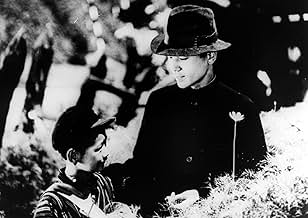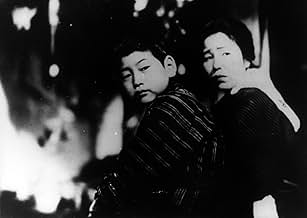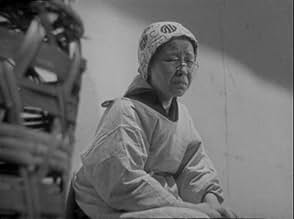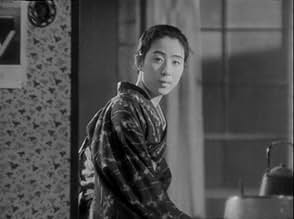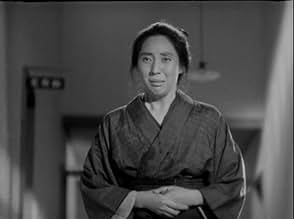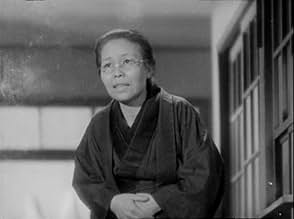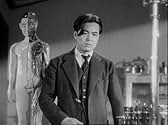PUNTUACIÓN EN IMDb
7,7/10
4,3 mil
TU PUNTUACIÓN
Una viuda descubre que su único hijo se ha convertido en un humilde profesor.Una viuda descubre que su único hijo se ha convertido en un humilde profesor.Una viuda descubre que su único hijo se ha convertido en un humilde profesor.
- Dirección
- Guión
- Reparto principal
Jun Yokoyama
- Okubo's son
- (as Bakudan Kozô)
Tomio Aoki
- Tomibo
- (as Tokkan Kozô)
Seiichi Katô
- Kinjo no ko
- (as Seiichi Kato)
Reseñas destacadas
"The Only Son" is Ozu's first "talkie" - and utilizes sounds in an efficient, restrained manner to help tell the story with calm grace. The beautiful simplicity that pervades the piece is classical Ozu, and amplifies the poignant tale of a mother coming back to visit her son, after sacrificing her livelihood to ensure he achieves higher education. When she realizes that he is unsatisfied with his life as a night-school teacher, a general melancholic tone begins to unfold through the progression of the narrative. The ending is nicely done, and overall, the film is crafted in that spare, simple perfection that is the stylistic hallmark of Ozu's cinema.
While having the privileged importance of being great director Yasujiro Ozu's first sound film, The Only Son also remains important for its emergence as the first truly "Ozu" work, in the sense that the very particular cinematic and thematic elements which make up what he is best known for coalesce together in a thoroughly emotional experience.
The story is simple enough, as Ozu usually tells. A widow attempts to save enough money for her son to go to college in Tokyo. She visits him years later, only to discover that he is not living the kind of sophisticated, well-off life she believed he would lead as a result of a college degree. What Ozu does with these characters is astonishing; he shows them in the most serene and simple of situations and settings yet uses his unique directing style to elicit subtle feelings and thoughts simmering just below the surface.
What this seems to suggest is Ozu's feelings regarding Japan in the 1930s, a tumultuous period in which the age of modernization seemed to be waning and Japanese society continued to be pressured into a militaristic hegemony. Clearly, Ozu resisted these transitions and his best offense was the films he made. The result is a quiet, gentle yet intense story about simple people wishing their lives, or the lives of their children, were better than they are. Through this, Ozu seems to reflect on the failure of Japanese innovation up to that point and the uncertainty of what the future might bring. Fortunately for the viewer, his specific style and insight remain as coherent and profound as ever.
The story is simple enough, as Ozu usually tells. A widow attempts to save enough money for her son to go to college in Tokyo. She visits him years later, only to discover that he is not living the kind of sophisticated, well-off life she believed he would lead as a result of a college degree. What Ozu does with these characters is astonishing; he shows them in the most serene and simple of situations and settings yet uses his unique directing style to elicit subtle feelings and thoughts simmering just below the surface.
What this seems to suggest is Ozu's feelings regarding Japan in the 1930s, a tumultuous period in which the age of modernization seemed to be waning and Japanese society continued to be pressured into a militaristic hegemony. Clearly, Ozu resisted these transitions and his best offense was the films he made. The result is a quiet, gentle yet intense story about simple people wishing their lives, or the lives of their children, were better than they are. Through this, Ozu seems to reflect on the failure of Japanese innovation up to that point and the uncertainty of what the future might bring. Fortunately for the viewer, his specific style and insight remain as coherent and profound as ever.
Of all the major directors in the world, Ozu was the last one to convert to sound; "The Only Son" was his first "all-talkie" film (in 1936), and it is remarkably inventive (technically) as well as deeply moving. Once again, his film deals with family dynamics: in this case, a widowed mother who has worked selflessly to provide her son with an education. But when she goes to visit him, she finds that he has not fulfilled his promise: he's stuck in a mediocre job, he has a wife and child and can't make any drastic changes because of his responsibilities. The ways that the mother and son try to reach an understanding, and their mutual resignation to the disappointments of life, create a glancing but powerful sense of that "quiet desperation" which was so often Ozu's theme.
This is a nice piece of work from early Japanese cinema that's worth checking out for all fans of this period's films.
The plot is simple, nothing really special if you ask me, but Ozu sure knew how to handle this kind of simple stories he portrayed in all his films. It's a slow-paced film, which adds a more natural feeling to it in my opinion, full of powerful and emotional images supported by a really splendid and natural acting (as usual in Ozu's films).
Ozu really stands out from many other directors, he had the ability to portray life on screen and here you can definitely see it.
At first this kind of filmmaking didn't do much for me, but it has really grown on me with time. It surely is not for everyone; Ozu is just different cinema.
My score: 8.5/10
The plot is simple, nothing really special if you ask me, but Ozu sure knew how to handle this kind of simple stories he portrayed in all his films. It's a slow-paced film, which adds a more natural feeling to it in my opinion, full of powerful and emotional images supported by a really splendid and natural acting (as usual in Ozu's films).
Ozu really stands out from many other directors, he had the ability to portray life on screen and here you can definitely see it.
At first this kind of filmmaking didn't do much for me, but it has really grown on me with time. It surely is not for everyone; Ozu is just different cinema.
My score: 8.5/10
In 1923, in the province of Shinshu, the widow and simple worker of a silk factory Tsune Nonomiya (O-Tsune) decides to send her only son to Tokyo for having a better education. Thirteen years later, she visits her son Ryosuke Nonomiya (Shinichi Himori), and finds that he is a poor and frustrated night-school teacher with a wife, Sugiko (Yoshiko Tsubouchi), and a baby boy.
"Hitori Musuko" is a poignant, heartbreaking, sensitive and beautiful movie about expectations, frustrations, revelations and hope in life. Once again the major concern of Ozu is with the family and human relationship. In "Hitori Musuko", Ozu brilliantly uses the sound, recent in 1936, in the end of the simple but touching story, when the machines in the factory stop working symbolizing the death of Tsune. I saw this movie in a Brazilian cable television in a copy that certainly needs restoration, and I regret to inform that only "Ohayô" has been released on DVD in Brazil. Only in festivals, and occasionally in cable television, Brazilians have the chance to see the work of this great director. Seeing the number of votes of this masterpiece in IMDb (only 88 votes), I believe that the distribution problem of this film might be international. My vote is ten.
Title (Brazil): "Filho Único" ("Only Son")
"Hitori Musuko" is a poignant, heartbreaking, sensitive and beautiful movie about expectations, frustrations, revelations and hope in life. Once again the major concern of Ozu is with the family and human relationship. In "Hitori Musuko", Ozu brilliantly uses the sound, recent in 1936, in the end of the simple but touching story, when the machines in the factory stop working symbolizing the death of Tsune. I saw this movie in a Brazilian cable television in a copy that certainly needs restoration, and I regret to inform that only "Ohayô" has been released on DVD in Brazil. Only in festivals, and occasionally in cable television, Brazilians have the chance to see the work of this great director. Seeing the number of votes of this masterpiece in IMDb (only 88 votes), I believe that the distribution problem of this film might be international. My vote is ten.
Title (Brazil): "Filho Único" ("Only Son")
¿Sabías que...?
- CuriosidadesThis was Yasujirô Ozu's first feature film with all-synchronous dialogue.
- ConexionesFeatured in A Train Arrives at the Station (2016)
- Banda sonoraOld Black Joe
Written by Stephen Foster
Selecciones populares
Inicia sesión para calificar y añadir a tu lista para recibir recomendaciones personalizadas
- How long is The Only Son?Con tecnología de Alexa
Detalles
- Duración1 hora 22 minutos
- Color
- Mezcla de sonido
- Relación de aspecto
- 1.37 : 1
Contribuir a esta página
Sugerir un cambio o añadir el contenido que falta

Principal laguna de datos
By what name was El hijo único (1936) officially released in India in English?
Responde
